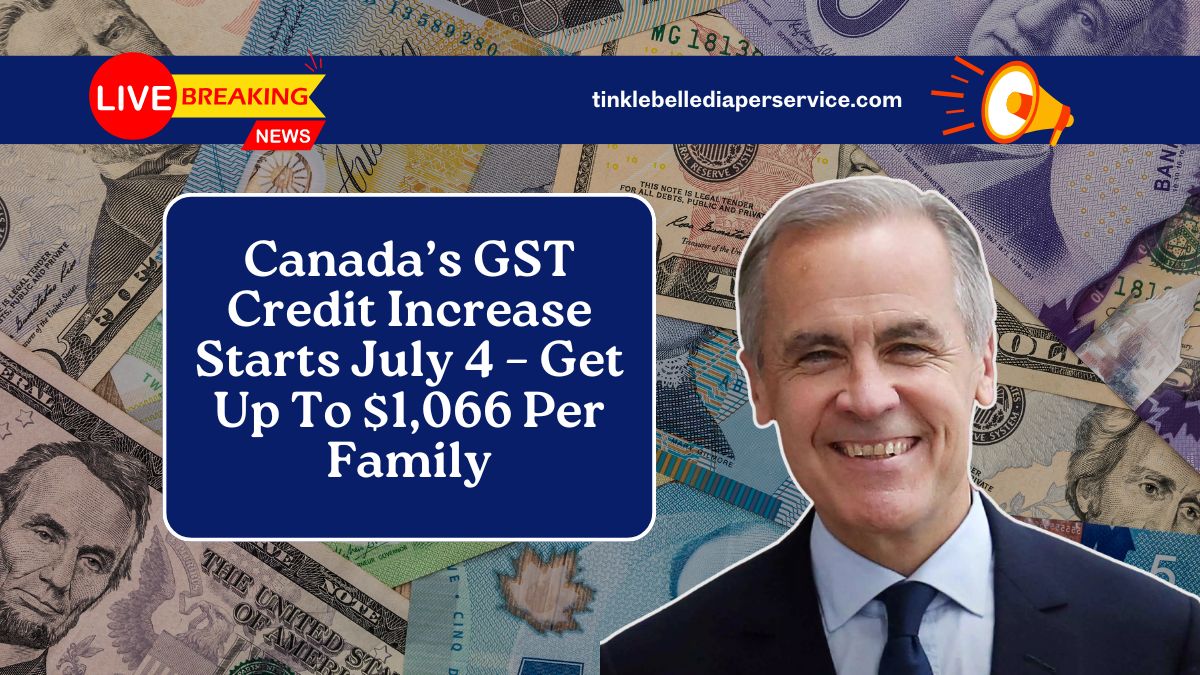Starting July 4, 2025, the Canada Revenue Agency (CRA) will implement a 2.7% increase in the Goods and Services Tax/Harmonized Sales Tax (GST/HST) credit, providing additional financial support to low- and modest-income individuals and families across Canada.
This adjustment aims to alleviate the burden of rising living costs by offering tax-free quarterly payments.
Understanding the GST/HST Credit
The GST/HST credit is a tax-free quarterly payment designed to offset the sales tax burden for eligible Canadians.
Administered by the CRA, this benefit is automatically determined based on your annual tax return, ensuring that those with lower incomes receive appropriate support.
What’s Changing in July 2025?
Effective July 4, 2025, the GST/HST credit will see a 2.7% increase, reflecting adjustments for inflation. While this is a modest rise compared to the previous year’s 4.7% boost, it still offers meaningful relief to eligible recipients.
2025 GST/HST Credit Amounts
The amount you receive depends on your adjusted family net income (AFNI) and family composition. Here’s a breakdown of the maximum annual amounts:
| Household Type | 2025 Annual Amount |
|---|---|
| Single adult | Up to $349 |
| Married or common-law couple | Up to $698 (combined) |
| Per child under 19 | Up to $184 |
| Low-income single supplement | Up to $184 |
Examples:
- A family of four (2 adults, 2 children) could receive up to $1,066 annually, equating to $266.50 per quarter.
- A single parent with one child might get up to $533 per year, or $133.25 quarterly.
Income Thresholds for 2025
Eligibility and payment amounts are influenced by your AFNI. The 2025 thresholds are as follows:
| Criteria | 2025 Amount |
|---|---|
| Phase-in threshold | $11,337 |
| Phase-out threshold | $45,521 |
If your income exceeds the phase-out threshold, your credit amount will gradually decrease.
Eligibility Criteria
To qualify for the GST/HST credit in 2025, you must:
- Be a Canadian resident for income tax purposes.
- Be 19 years or older, or under 19 and:
- Have a spouse or common-law partner, or
- Be a parent living with your child.
Newcomers to Canada, including:
- Permanent residents
- Protected persons (refugees)
- International students
- Work permit holders
may also be eligible upon meeting residency and income criteria.
Who Is Not Eligible?
You are not eligible if:
- Your income exceeds the established thresholds.
- You did not file your 2024 tax return.
- You are not a resident of Canada for tax purposes.
2025 GST/HST Credit Payment Dates
The CRA issues GST/HST credit payments quarterly. For 2025, the scheduled dates are:
| Quarter | Payment Date |
|---|---|
| Q1 | July 4, 2025 |
| Q2 | October 3, 2025 |
| Q3 | January 3, 2026 |
| Q4 | April 3, 2026 |
Note: If a payment date falls on a weekend or holiday, payments are issued on the preceding business day.
How to Apply for the GST/HST Credit
If You’re Already in Canada:
- Simply file your 2024 tax return, even if you have no income.
- The CRA will automatically assess your eligibility.
If You’re a Newcomer:
- Without children: Complete Form RC151 and submit it to your local CRA tax centre.
- With children: Fill out Form RC66 and RC66SCH, then apply online through CRA My Account or by mail.
Tips to Ensure Timely Payments
- File your 2024 taxes early to avoid delays.
- Set up direct deposit with the CRA for faster access.
- Keep your personal information (address, marital status, number of children) up to date with the CRA.
FAQs
How do I know if I’m eligible for the GST/HST credit?
Eligibility is based on your adjusted family net income, marital status, and number of children. Filing your 2024 tax return allows the CRA to assess your eligibility automatically.
What should I do if I don’t receive my payment on the scheduled date?
Wait 10 business days after the payment date. If you still haven’t received it, contact the CRA at 1-800-387-1193.
Can I receive the GST/HST credit if I’m a newcomer to Canada?
Yes, newcomers may be eligible. You’ll need to complete the appropriate forms (RC151 or RC66/RC66SCH) and submit them to the CRA.

